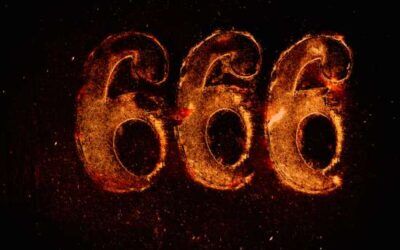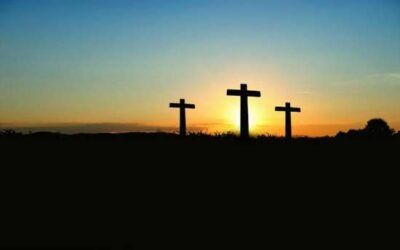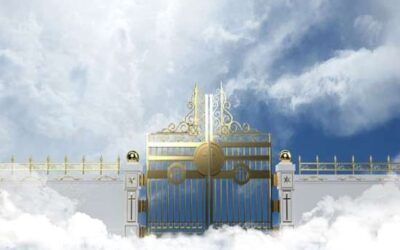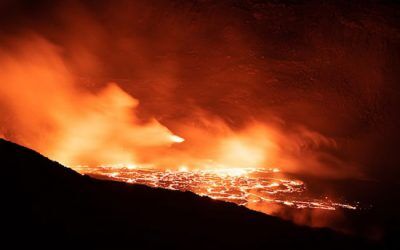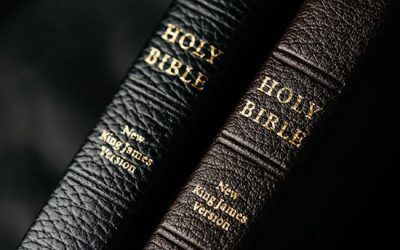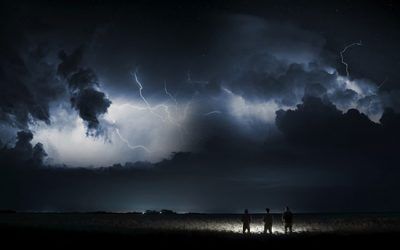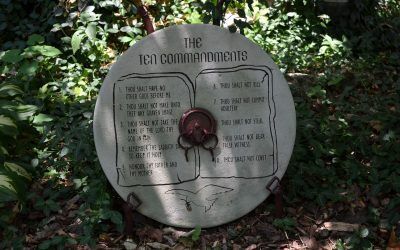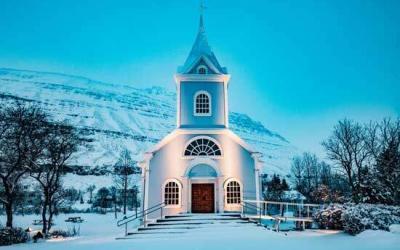As most Christians, Seventh-day Adventists hope for the time when sin and evil will no longer exist. The Bible teaches that God will bring an end to sin after a thousand-year period of time called the millennium.
The millennium takes place right after the second coming of Christ, when God’s people will go with Him to heaven. After the millennium, the New Jerusalem will come down from heaven, and the final judgment of those who have not chosen God, the unbelievers, will take place.
Then, God’s people will be able to live with Him forever on a perfect new earth.
We’ll expand on this timeline of events by looking at:
- What is the millennium?
- What happens during the millennium?
- What happens after the millennium?
- How will God bring an end to sin forever?
If you’ve been wondering about these questions, keep reading for the Bible’s answers.
What is the millennium in the Bible?
Photo by Laith Abushaar on Unsplash
The millennium, which means “one thousand years,” refers to the thousand-year period in the Bible that will take place after the second coming of Jesus (Revelation 20:2–7). It goes from the resurrection of God’s people to the resurrection of the unbelievers right before the destruction of sin and evil.
You may have heard people talk about this period in the context of the end of the world and the return of Jesus.
Many websites, movies, and books discuss it—even though they often say different things regarding what it is, where it takes place, and what happens during that time.
Even Christians have different views about the millennium. Here are some beliefs you might encounter:
- Premillennialism: the teaching that Christ will return to the earth and set up His millennial kingdom here on earth
- Postmillennialism: the belief that God’s people will have one thousand years of peace and prosperity here on this earth as they prepare for Christ to come after the one thousand years end
- Amillennialism: the belief that the millennium happens in a symbolic sense with Christ reigning in the hearts of believers prior to His second coming
So what does the Bible really say?
Despite the common use of the term millennium, the word itself never appears in the Scriptures. But the book of Revelation depicts this concept:
“He laid hold of the dragon, that serpent of old, who is the Devil and Satan, and bound him for a thousand years; and he cast him into the bottomless pit, and shut him up, and set a seal on him, so that he should deceive the nations no more till the thousand years were finished. But after these things he must be released for a little while.
“And I saw thrones, and they sat on them, and judgment was committed to them. Then I saw the souls of those who had been beheaded for their witness to Jesus and for the word of God, who had not worshiped the beast or his image, and had not received his mark on their foreheads or on their hands.
“And they lived and reigned with Christ for a thousand years. But the rest of the dead did not live again until the thousand years were finished. This is the first resurrection.
“Blessed and holy is he who has part in the first resurrection. Over such the second death has no power, but they shall be priests of God and of Christ, and shall reign with Him a thousand years.
“Now when the thousand years have expired, Satan will be released from his prison” (Revelation 20:2–7, NKJV).
In summary, this passage describes the following events happening during the millennium:
- Those who have chosen Christ live and reign with Him for one thousand years in heaven
- Those who rejected Christ remain in their graves on earth
- Satan is bound on earth
Adventists hold to this biblical understanding of the millennium. Here’s our official statement of belief about it:
“The millennium is the thousand-year reign of Christ with His saints in heaven between the first and second resurrections.
During this time the wicked dead will be judged; the earth will be utterly desolate, without living human inhabitants, but occupied by Satan and his angels.
At its close, Christ with His saints and the Holy City will descend from heaven to earth. The unrighteous dead will then be resurrected, and with Satan and his angels will surround the city; but fire from God will consume them and cleanse the earth.
The universe will thus be freed of sin and sinners forever.”
Let’s dig into these concepts, starting with the timing of the millennium.
When will the millennium take place?
Photo by Sebastien Gabriel on Unsplash
According to the Bible, the millennium occurs after the second coming of Jesus Christ, between the resurrection of the godly (known as the first resurrection) and the resurrection of the unbelievers (known as the second resurrection).
So let’s look for a moment at the Second Coming in the Bible:
“For the Lord Himself will descend from heaven with a cry of command, with the voice of an archangel, and with the sound of the trumpet of God. And the dead in Christ will rise first. Then we who are alive, who are left, will be caught up together with them in the clouds to meet the Lord in the air, and so we will always be with the Lord” (1 Thessalonians 4:16–17, ESV).1
The Second Coming is a crucial event because “the dead in Christ”—those who have accepted His sacrificial death on the Cross—will rise from the dead and live forever.
They will be “raised imperishable…. And this corruption must put on incorruption, and this mortal must put on immortality” (1 Corinthians 15:51–54, ESV).
The Bible calls this event “the first resurrection,” as we saw in Revelation 20:4–7:
“And I saw thrones, and they sat on them, and judgment was committed to them. Then I saw the souls of those who had been beheaded for their witness to Jesus and for the word of God, who had not worshiped the beast or his image, and had not received his mark on their foreheads or on their hands.
And they lived and reigned with Christ for a thousand years…
This is the first resurrection.
Blessed and holy is he who has part in the first resurrection. Over such the second death has no power, but they shall be priests of God and of Christ, and shall reign with Him a thousand years” (NKJV, emphasis added).
The words for “souls” (sometimes translated as “life”) is not referring to a spirit separated from a body. This is apparent because these “souls” are part of the first resurrection which happens at the Second Coming.
These resurrected believers will receive new bodies (1 Corinthians 15:42–44); they won’t be disembodied spirits floating around heaven.
After being raised in the first resurrection, they will “be priests of God and of Christ, and shall reign with Him a thousand years” (Revelation 20:6, NKJV). More on that soon.
What happens during the millennium?
Photo by Wendy Scofield on Unsplash
The events of the millennium depend on who we’re talking about. Christ’s followers will be in heaven with God and the angels. Meanwhile, the unbelievers will be dead on the earth, and Satan and all his evil angels will be bound on the earth.
Let’s uncover in detail what will happen with each group.
The unbelievers during the millennium
During the millennium, no unbelievers will still be living on the earth.
Why?
Because at this point, all decisions have been made, and God will honor those decisions.
Those who chose eternal life will be taken to heaven.
Those who didn’t accept the free gift of salvation who are still living when Jesus comes will not be able to survive the glory of God, as sin cannot exist in God’s perfect, selfless presence (2 Thessalonians 2:8).
Those unbelievers who are dead when Christ returns will remain in their graves.
According to the Bible, they will stay in their graves on this earth in the unconscious sleep of death until the second resurrection (Revelation 20:5)—what the Bible calls “the resurrection of condemnation” (John 5:29, NKJV).
Besides the unbelievers who rest in their graves until the second resurrection, the earth will be empty during the millennium (Isaiah 26:21). The prophet Jeremiah, looking ahead to this time, depicted it like this:
“I beheld the earth, and indeed it was without form, and void; and the heavens, they had no light. I beheld the mountains, and indeed they trembled, and all the hills moved back and forth. I beheld, and indeed there was no man” (Jeremiah 4:23–25, NKJV).
The phrase “without form and void” is the same phrase used in Genesis 1:2 to describe the earth before Creation. It’s as if the earth will revert to that chaos and lifelessness.
Satan during the millennium
Photo by João Pedro Salles on Unsplash
Revelation 20 also tells us what will happen to Satan during the millennium:
“Then I saw an angel coming down from heaven, having the key to the bottomless pit and a great chain in his hand. And he laid hold on the dragon, that old serpent, which is the Devil, and Satan, and bound him a thousand years. And cast him into the bottomless pit, and shut him up, and set a seal upon him, that he should deceive the nations no more, till the thousand years should be fulfilled: and after that he must be loosed a little season” (Revelation 20:1–3, NKJV).
“And when the thousand years are expired, Satan shall be loosed out of his prison” (Revelation 20:7, NKJV).
While the earth is empty, Satan is “shut up,” “bound,” and “cast into the bottomless pit.”
What does all this mean?
First, the phrase translated “bottomless pit” comes from a Greek word meaning “abyss.”
This is the same word used in a Greek translation of Genesis 1:2, which referred to darkness upon the face of the earth.
So, for the millennium, Satan is bound on the earth. It’ll be a lonely and dead planet with no human life, having been ravaged by end-time plagues (Revelation 15–16), a giant earthquake (Revelation 16:18), and the devastation that will have occurred at Christ’s return.
During this time, Satan can no longer “deceive the nations” because all the nations are gone (Revelation 20:3). And he won’t be able to go anywhere else either.
For a thousand years, he will be bound to the earth by these circumstances.
The righteous during the millennium
Photo by Daniel Barnes on Unsplash
As we’ve already learned, Christ’s followers who have been dead will be resurrected at the Second Coming. Those who are alive will also meet Christ in the air, and these two groups will go to heaven to be with Him. They will do a special work of judgment there.
The apostle Paul describes it this way:
“Then we who are alive and remain shall be caught up together with them in the clouds to meet the Lord in the air. And thus we shall always be with the Lord” (1 Thessalonians 4:17, NKJV).
They will be living and reigning with Christ in heaven—the place where He had promised to take them after He returned (John 14:1–3).
In fact, Revelation 20:4, which introduces the resurrected ones reigning with Christ, also talks about “thrones.”
This is a word in Revelation that, with rare exception, usually refers to heaven and not earth.2
Notice what else Revelation says about these godly ones:
“And I saw thrones, and they sat on them, and judgment was committed to them” (Revelation 20:4, NKJV).
Compare this with what Paul says:
“Do you not know that the saints will judge the world?… Do you not know that we shall judge angels? How much more, things that pertain to this life?” (1 Corinthians 6:2–3, NKJV).3
But we have been told not to judge others (Matthew 7:1–5).
So why would humans be involved in any sort of judgment proceedings?
After all, we know so little about others, their circumstances, and the things in their lives that cause them to do what they do. We wouldn’t be able to judge fairly.
But this text isn’t referring to our lives right now.
The Bible is talking about God’s people in heaven, having a thousand years to get their questions answered about the many things that have happened on earth.
Imagine that you’re in heaven with God.
You’re taking in the absolute joy and glory and wrapping your renewed mind around the concept of eternity. But you realize that someone you loved and expected to be there isn’t. How would you feel? Wouldn’t you have a million questions?
Photo by Susan Q Yin on Unsplash
While the unbelievers continue to sleep in their graves, the millennial judgment provides the righteous an opportunity to look into God’s dealings. God will take us all with Him through the judgment process, providing an insider look at the decisions people made throughout their lives.
As a result, we’ll be able to draw our own conclusion that God has been loving and just in all His ways. He has respected free will. Those not in heaven will have opted not to be there.
Only then will we be able to proclaim with confidence,
“Even so, Lord God Almighty, true and righteous are Your judgments” (Revelation 16:7, NKJV).4
And only then are the lost ultimately punished.
What happens at the end of the millennium?
Photo by Pisit Heng on Unsplash
The big event following the millennium will be the resurrection of the unbelievers in the second resurrection (Revelation 20:5). As they acknowledge God’s patience and goodness toward them (Philippians 2:10), they will receive their fair consequences, together with Satan and his evil angels.
This resurrection of the unbeliever is called the “resurrection of condemnation” (John 5:28). Satan will also be released because he will again have people to deceive:
“Now when the thousand years have expired, Satan will be released from his prison and will go out to deceive the nations which are in the four corners of the earth, Gog and Magog, to gather them together to battle, whose number is as the sand of the sea” (Revelation 20:7–8, NKJV).
During the thousand years, all the unbelievers were dead, but when they are resurrected, Satan will get back to his work of deception. He will convince these newly-resurrected people to attack the New Jerusalem that comes down from heaven (Revelation 12:2).
All of them will gather for battle:
“They went up on the breadth of the earth and surrounded the camp of the saints and the beloved city” (Revelation 20:9, NKJV).
But they will not succeed.
Instead, they will face the just judgment of God—the natural result of choosing to hold onto sin. Here’s how Revelation describes it:
“They went up on the breadth of the earth and surrounded the camp of the saints and the beloved city. And fire came down from God out of heaven and devoured them” (Revelation 20:9, NKJV).
Photo by Ricardo Gomez Angel on Unsplash
Notice what else the chapter says about these events:
“And I saw the dead, small and great, standing before God, and books were opened…. And the dead were judged according to their works, by the things which were written in the books…. And they were judged, each one according to his works. Then Death and Hades were cast into the lake of fire. This is the second death” (Revelation 20: 12-14, NKJV).
But if salvation is by faith, why would these people be judged according to their works?
It might sound backward to you. But think about it this way:
Christ died in their place and willingly took their punishment, but they chose to reject that gift. Now, they must face the justice that they have long deserved. Christ’s sacrifice does not cover their punishment because they didn’t accept it. So they are judged by their works.
For those of us who have struggled with all the evil that goes unpunished in this world now, we can be comforted that there will be justice.
Evil will be punished with what is known as “the second death” (Revelation 20:6, 14; 21:8).
How does God bring an end to sin and death forever?
Photo by wisconsinpictures on Unsplash
God brings an end to sin and death by completely destroying them with fire on the earth (Revelation 20:9). He doesn’t do so out of anger against people, but out of a hatred for what sin does to His people. Because He longs for His people to be able to live in a perfect world again, sin must be destroyed—and all those who refuse to let go of it. Then, God will be able to recreate the earth (Revelation 21:1).
John 3:16 tells us that “God so loved the world that He gave His only begotten Son, that whoever believes in Him should not perish but have everlasting life” (NKJV).
The contrast here is not between two forms of eternal life, one in heaven and one in hell. It’s between eternal life and perishing.
And “perish” means to die—to be destroyed. As we read in Revelation 20:9, the unbelievers are devoured by the fire.
Many passages in both the Old Testament and the New Testament repeat this idea:
“These shall be punished with everlasting destruction from the presence of the Lord and from the glory of His power” (2 Thessalonians 1:9, NKJV).
It is the destruction that is everlasting, not the act itself of destroying (Psalm 37:9; Philippians 3:19; Matthew 10:28). This means that God doesn’t torture people in hellfire forever.
In fact, God doesn’t even want to destroy anyone; it’s a strange act to Him (Isaiah 28:21). But sin can’t exist in the presence of God who is perfectly selfless and loving. That means that anyone who continues to cherish sin will no longer be able to exist either.
This punishment—“the second death” (Revelation 20:6, 14; 21:8)—is eternal.
So at the end of the millennium, after God’s people have had a thousand years in heaven to judge and reign with Christ, Satan and his followers will cease to exist.
And fire will cleanse the earth once and for all of sin:
“But the day of the Lord will come as a thief in the night, in which the heavens will pass away with a great noise, and the elements will melt with fervent heat; both the earth and the works that are in it will be burned up” (2 Peter 3:10, NKJV).
The end of sin, death, and evil
The millennium is the precursor to our world being freed from evil and sin. It gives God’s people the chance to study His fairness and be confident that God is doing the right thing when He judges sinners and allows them to experience the consequences of their choices.
They will know that God has done everything possible to prevent the destruction of each human being.
Jesus came to earth as our Messiah for this very reason. He lived a human life and died a terrible death to take the consequences of sin we deserved (Romans 6:23). And because He did, He can offer us eternal life in a new world—just like it was before sin.
If we reject His offer, we will return to non-existence.
But if we choose Jesus, eternal life in the “new heavens and a new earth in which righteousness dwells” can be ours (2 Peter 3:13, NKJV).
Then, the earth will not have any more sin, evil, pain, or suffering (Revelation 21:4).
Finally, perfect justice will be done for all the injustices that have plagued our world.
And the best news is that this is what God wants for us! He wants us to choose Him, not to be forced to follow Him. He wants to give us eternal bliss in the perfect earth He intended for us.
All we need to do is make the conscious choice for Christ. We can decide today to begin fostering a relationship with Jesus and walking in obedience to His will by the power of His Spirit.
This way, we can be assured of being part of the first resurrection and enjoying eternal life in the kingdom of God forever!
Choose an Online Bible Study
Want to keep learning? Find out more about Jesus, humanity, the plan of salvation, and how God loves you enough to sacrifice everything, just to give you a chance to choose Him.
Sometimes it can be hard to know where to start, that’s why we offer free, user-friendly, online Bible study options you can do anytime, anywhere, and at your own pace.
This online Bible school will take you through the major themes of Scripture, breaking down the Bible’s complex concepts into bite-sized pieces, which can lead you toward the answers of life’s more challenging questions.
Related Articles
More Answers
Adventist Beliefs
Learn how the 28 Fundamental Beliefs summarize and describe Seventh-day Adventism. They are not a checklist of requirements; instead they show how Adventists interpret and apply Scripture.
What Do Adventists Believe About the Authority of the Bible?
Learn how one really old book (the Bible) is the sole foundation for all Seventh-day Adventist beliefs.
Is the Soul Immortal? Exploring What Adventists Believe
Based on the way the Bible describes humanity in comparison to God and angels, Seventh-day Adventists believe souls are not something you have, but something you are.
What Do Adventists Believe About the Mark of the Beast and 666?
It’s a popular topic, especially during tumultuous times. When everything around you feels chaotic, it’s easy to wonder about the end of the world, and topics like the mark of the beast, as mentioned in Revelation 13, can stir up uneasiness.
What Do Adventists Believe About the Atonement?
If you’ve spent much time in the Bible books of Leviticus or Numbers, you might’ve noticed the word atonement.
Do Seventh-day Adventists Believe Only They Will Go to Heaven?
No, Adventists definitely don’t believe they’re the only ones that will go to heaven. As a matter of fact, we don’t believe admittance into heaven is ever based on which church or denomination we belong to. People all over the world from different Christian denominations, religions, and walks of life will be welcomed by Jesus.
How Adventists Developed the Sanctuary Doctrine and What It Means
The sanctuary was a building at the center of ancient Israelite society that gives us a small picture of the original sanctuary, God’s throne room in heaven (Hebrews 8:1-2).
What Do Adventists Believe About Faith and Works?
Adventists believe we are saved by faith, which is the belief and trust we have in Jesus to save us from our sins. Jesus, then, enables us to live in harmony with God’s commandments and serve others with love—sometimes referred to as “works.”
Do Seventh-day Adventists Believe in Hell?
Seventh-day Adventists believe that any human being who accepts God’s free gift of salvation through Jesus will be given eternal life. But what about the eternal fate of those who choose not to accept Jesus?
Sola Scriptura—What It Means and Why It Matters
Sola scriptura is a term that originated during the Protestant Reformation. It represents the way many Christians view the Bible and its authority. While the idea is simple enough, there is so much more to sola scriptura than its basic definition.
Do Seventh-day Adventists Believe in the Secret Rapture
The secret rapture belief asserts that the followers of Jesus will be suddenly and stealthily “raptured” from earth and taken to heaven. Then, any people left on earth will face a period of great difficulty—before Christ’s second coming actually happens.
Why do Adventists Emphasize Religious Liberty?
Adventists see religious liberty as an essential human right. After all, God endowed humanity with freedom of choice from the very beginning. So we believe it’s best for governments to also support their citizens’ rights to worship based on their convictions.
What Seventh-day Adventists Believe About Growing in Christ
Christian growth is the experience of allowing Jesus Christ to work in our lives through the Holy Spirit and restore in us the image we were designed for—God’s image of selfless, other-centered love.
What Do Seventh-day Adventists Believe about the New Earth?
Seventh-day Adventist, like other Christians, believe that after the second coming of Christ, God will cleanse our earth by fire and then restore it back to Eden-like perfection.
What Are Seventh-day Adventists Beliefs on Death and the Resurrection?
The thought of dying can seem scary. And the idea of being resurrected—or coming back to life—can seem a little uncomfortable.
What Do Seventh-day Adventists Believe about The Second Coming of Christ?
The second coming of Jesus Christ is an event the Bible prophesies will occur at the end of this world’s history. It’s called His second coming to distinguish it from His first, when Jesus was born to Mary and lived as a human before dying on the Cross.
What Adventists Believe About Jesus’ Ministry in the Heavenly Sanctuary
The ancient Israelite sanctuary had a daily service and a yearly service. Jesus’ death on the Cross and His ministry in the heavenly sanctuary reflect these services.
What do Seventh-day Adventists Believe about Marriage and Family?
The Seventh-day Adventist Church believes God established marriage and the family unit to be blessings to humanity. They make up a relational structure that can reflect the multifaceted nature of God’s love.
What Seventh-day Adventists Believe about Christian Behavior
The patterns of actions and words that make up behavior are central to any type of belief system because they flow from those beliefs. Seventh-day Adventists look to the Bible, with Jesus as the perfect example, for guidance on shaping our daily behavior.
What do Seventh-day Adventists Believe about the Sabbath?
Seventh-day Adventists believe that the biblical Sabbath is a beautiful gift of rest that God gave to us at Creation and that remains valid to this day. Falling on the seventh day of the week—Saturday—it connects us to God in a special way and offers us a weekly opportunity to be physically, mentally, and spiritually refreshed.
What Seventh-day Adventists Believe about Stewardship (and What Does It Mean?)
Love for God and our fellow humans is the overriding principle of the Seventh-day Adventist faith. And we express that love in an overarching way through how we manage the things—material and immaterial—that God has entrusted to us.
What Do Adventists Believe About the Law of God?
Seventh-day Adventists believe that God’s law reflects His character of love (1 John 4:8; Romans 13:10). It is perfectly summarized in the Ten Commandments given to Moses on Mount Sinai, showing us the practical application of loving God and loving other people.
What Do Seventh-day Adventists Believe About the Gift of Prophecy?
Adventists believe the gift of prophecy is a spiritual gift that the Holy Spirit gives to specific individuals to help the church carry out Jesus’ Great Commission (Matthew 28:16–20). Prophecy helps strengthen, encourage, and comfort His people (1 Corinthians 14:3).
What Seventh-day Adventists Believe About Spiritual Gifts in the Bible
Seventh-day Adventists believe that spiritual gifts are talents that the Holy Spirit gives to believers and followers of Jesus Christ. These gifts are different but complementary, and they often equip followers of Christ with the ability to spread the good news about Jesus and encourage its members.
What do Seventh-day Adventists Believe about the Lord’s Supper (Communion)?
Like many Protestant Christians, Seventh-day Adventists believe in the practice commonly called the Lord’s Supper or Holy Communion. They drink grape juice and eat unleavened bread in obedience to Jesus’ direct instructions to do it in remembrance of Him (1 Corinthians 11:24–25).
What do Seventh-day Adventists Believe about Baptism?
Like many Protestant Christians worldwide and throughout history, the Seventh-day Adventist Church believes in baptism, a ceremony in which individuals go under water to publicly demonstrate dying to an old life and beginning a new life in Christ. We baptize people by immersion, as taught and exemplified in the Bible.
What Do Seventh-day Adventists Believe about Unity in Christ?
Seventh-day Adventists believe in biblical unity—the idea of believers in Jesus being united by the truth of the Bible and the common goal of representing God and His love to the world.
What do Seventh-day Adventists Believe about the Remnant and its Mission?
The “remnant” are a group of faithful believers that have existed throughout history and proclaimed God’s truth, love, and plan to save humanity. They “remain” with God even amid persecution and also when it seems everyone else has rebelled against God or compromised their beliefs.
What do Seventh-day Adventists Believe about the Church?
Seventh-day Adventists believe that the idea of the church is an important biblical concept.
Didn’t find your answer? Ask us!
We understand your concern of having questions but not knowing who to ask—we’ve felt it ourselves. When you’re ready to learn more about Adventists, send us a question! We know a thing or two about Adventists.



